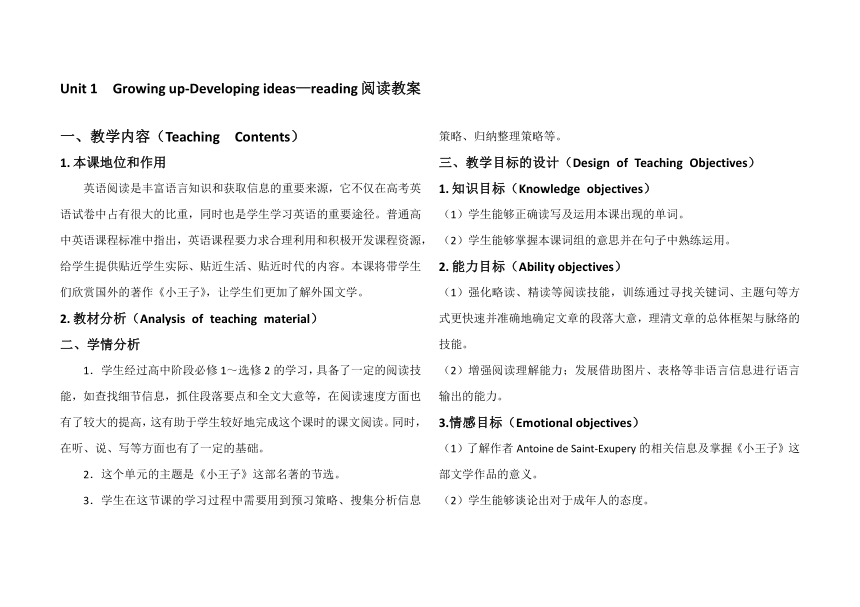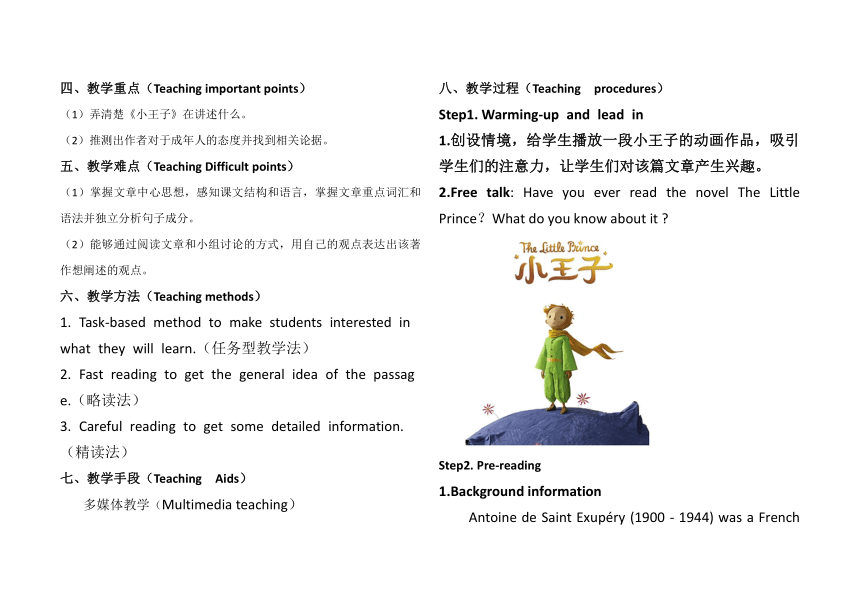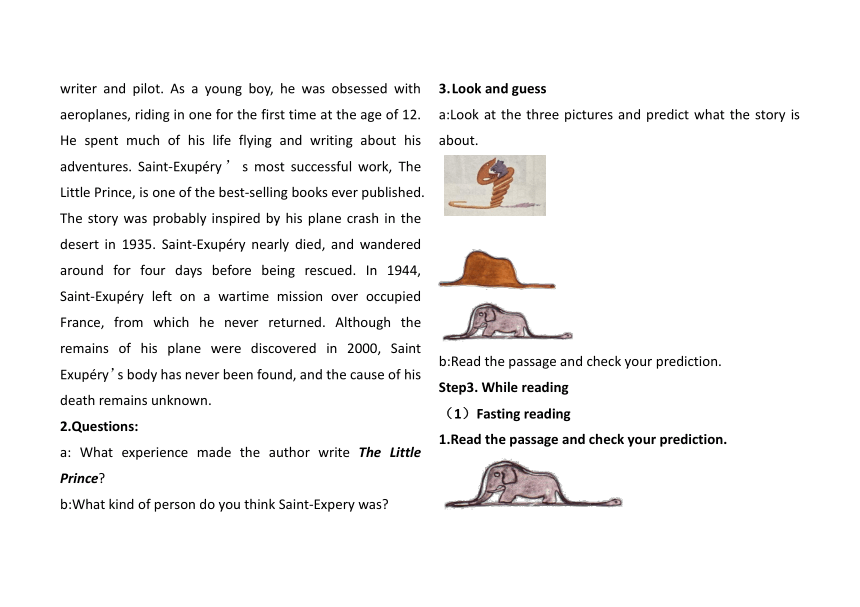外研版(2019)选择性必修第二册:Unit 1 Growing up Developing ideas 教案
文档属性
| 名称 | 外研版(2019)选择性必修第二册:Unit 1 Growing up Developing ideas 教案 |  | |
| 格式 | docx | ||
| 文件大小 | 274.9KB | ||
| 资源类型 | 教案 | ||
| 版本资源 | 外研版(2019) | ||
| 科目 | 英语 | ||
| 更新时间 | 2021-11-29 18:09:20 | ||
图片预览



文档简介
Unit 1 Growing up-Developing ideas—reading阅读教案
教学内容(Teaching Contents)
本课地位和作用
英语阅读是丰富语言知识和获取信息的重要来源,它不仅在高考英语试卷中占有很大的比重,同时也是学生学习英语的重要途径。普通高中英语课程标准中指出,英语课程要力求合理利用和积极开发课程资源,给学生提供贴近学生实际、贴近生活、贴近时代的内容。本课将带学生们欣赏国外的著作《小王子》,让学生们更加了解外国文学。
教材分析(Analysis of teaching material)
学情分析
学生经过高中阶段必修1~选修2的学习,具备了一定的阅读技能,如查找细节信息,抓住段落要点和全文大意等,在阅读速度方面也有了较大的提高,这有助于学生较好地完成这个课时的课文阅读。同时,在听、说、写等方面也有了一定的基础。
这个单元的主题是《小王子》这部名著的节选。
学生在这节课的学习过程中需要用到预习策略、搜集分析信息策略、归纳整理策略等。
教学目标的设计(Design of Teaching Objectives)
知识目标(Knowledge objectives)
(1)学生能够正确读写及运用本课出现的单词。
(2)学生能够掌握本课词组的意思并在句子中熟练运用。
能力目标(Ability objectives)
强化略读、精读等阅读技能,训练通过寻找关键词、主题句等方式更快速并准确地确定文章的段落大意,理清文章的总体框架与脉络的技能。
增强阅读理解能力;发展借助图片、表格等非语言信息进行语言输出的能力。
3.情感目标(Emotional objectives)
(1)了解作者Antoine de Saint-Exupery的相关信息及掌握《小王子》这部文学作品的意义。
(2)学生能够谈论出对于成年人的态度。
教学重点(Teaching important points)
(1)弄清楚《小王子》在讲述什么。
(2)推测出作者对于成年人的态度并找到相关论据。
教学难点(Teaching Difficult points)
(1)掌握文章中心思想,感知课文结构和语言,掌握文章重点词汇和语法并独立分析句子成分。
(2)能够通过阅读文章和小组讨论的方式,用自己的观点表达出该著作想阐述的观点。
六、教学方法(Teaching methods)
1. Task-based method to make students interested in what they will learn.(任务型教学法)
2. Fast reading to get the general idea of the passage.(略读法)
3. Careful reading to get some detailed information.(精读法)
七、教学手段(Teaching Aids)
多媒体教学(Multimedia teaching)
教学过程(Teaching procedures)
Step1. Warming-up and lead in
1.创设情境,给学生播放一段小王子的动画作品,吸引学生们的注意力,让学生们对该篇文章产生兴趣。
2.Free talk: Have you ever read the novel The Little Prince?What do you know about it
Step2. Pre-reading
1.Background information
Antoine de Saint Exupéry (1900 - 1944) was a French writer and pilot. As a young boy, he was obsessed with aeroplanes, riding in one for the first time at the age of 12. He spent much of his life flying and writing about his adventures. Saint-Exupéry’s most successful work, The Little Prince, is one of the best-selling books ever published. The story was probably inspired by his plane crash in the desert in 1935. Saint-Exupéry nearly died, and wandered around for four days before being rescued. In 1944, Saint-Exupéry left on a wartime mission over occupied France, from which he never returned. Although the remains of his plane were discovered in 2000, Saint Exupéry’s body has never been found, and the cause of his death remains unknown.
2.Questions:
a: What experience made the author write The Little Prince
b:What kind of person do you think Saint-Expery was
Look and guess
a:Look at the three pictures and predict what the story is about.
b:Read the passage and check your prediction.
Step3. While reading
Fasting reading
1.Read the passage and check your prediction.
A boa constrictor (蟒蛇) is digesting an elephant.
2.Work in groups.Give a free talk about your attitude towards grown-ups and why
(2)Intensive reading
Choose the author’s attitude towards grown-ups and find evidence to support your choice.
Grown-ups are more practical than children. They want to teach children knowledge that will be useful in the future.
2. Grown-ups are no better than children. They lack imagination and only care about matters of consequence.
3. Grown-ups are more knowledgeable than children. They can understand everything by themselves.
Evidence:
1. They always need to have things explained. (Para 6)
2. Grown-ups never understand anything by themselves, and it is tiresome for children to be always and forever explaining things to them. (Para 7)
3. …, I have had a great many encounters with a great many people who have been concerned with matters of consequence. (Para 9)
4. I would bring myself down to his level. I would talk to him about bridge, and golf, and politics, and neckties. And the grown-up would be greatly pleased to have met such a sensible man. (Para 12)
Step4. Posting reading
1.Read the sentences from the passage and answer the questions.
… I have had a great many encounters with a great many people who have been concerned with matters of consequence.
And the grown-up would be greatly pleased to have met such a sensible man.
Q1: What does the author really mean by these sentences
Q2: What figure of speech does the author use How does this figure of speech help to express the author’s attitude
Q1: What does the author really mean by these sentences
Most of the adults I have met are the same. They focus on practical matters only and seldom pay attention to imagination or creativity. If I pretend to think the way they do, the adults will conclude that I am sensible and mature.
Q2: What figure of speech does the author use How does this figure of speech help to express the author’s attitude
*Irony(讽刺,反语)
This figure of speech enables the author to indicate his low opinion of adults’ behavior and values by stressing such things.
2.Let’s appreciate some sentences
If you love a flower that lives on a star, it is sweet to look at the sky at night. All the stars are abloom with flowers ...
如果你爱上了一朵生长在一颗星星上的花,那么夜间你看着天空就感到甜蜜愉快。所有的星星上都好像开着花。
If you tame me, then we shall need each other. To me, you will be unique in all the world. To you, I shall be unique in all the world.
假如你驯养了我,我们就彼此需要了。对我而言,你就是举世无双的; 对你而言,我也是独一无二的 ……
Language points: Important Important sentences
1.Grown-ups never understand anything by themselves, and it is tiresome for children to be always and forever explaining things to them.
Paraphrase: Adults can’t always understand the world of children, so children feel tired and bored when they have to explain their thoughts to adults again and again.
it’s tiresome for sb to do sth 意为“某人厌烦去做某事”,句中it是形式主语,to do结构为真正的主语。
e.g. It is important for you to get there on time.
2.In the course of this life, I have had encounters with people who have been concerned with matters of consequence. I have lived a great deal among grown-ups. I have seen them intimately, close at hand. And that hasn’t much improved my opinion of them.
Paraphrase: In my life, I have met a lot of adults. Adults focus on things that they think very important, but which aren’t really. I have spent a lot of time living with adults and know them very well. My experience of living with adults has given me a low opinion of them.
a great many = a large number of / many / lots of / plenty of, 意为“很多”。需要注意的是,a great many 后接可数名词的复数形式,谓语动词也用复数形式。
e.g. He’s been to a great many places.
文章中两次使用 a great many, 是为了强调作者对成年人的看法是有依据的,也为后文的观点埋下了伏笔。
课后作业(Homework)
1.Collect more examples of using irony in English.
2.Read the passage fluently after class.
十一、教学反思(Teaching reflection)
这堂课基本做到了把课堂让给学生,让学生在自主、合作、探究的气氛中愉快度过,既顺利完成教学任务,又促进其情感教育。教学中融入了素质教育,且使学生在趣味中学得了知识,这也是目前提倡的教育教学理念。我感到多媒体教学用于英语阅读教学有很多好处:首先,课堂的导入是十分重要的,好的导入可以激发学生的学习兴趣,直观、生动的图片、动画使得学生更容易进入学习状态,把学生从枯燥的课堂解放 ,有利于师生的互动, 能更好地实现教师的教学意图。其次,多媒体课的容量大,使得教师核对答案更容易。因此,教师可以把原来花在板书的时间用于指导学生,或设计一些多样的题型。再者,我通过听录音,朗读课文,配以在幻灯片呈现问题,让学生有目的性带着问题去听课文,朗读课文,一部分一部分的分析课文,解决问题。在此过程中,不同的任务设置激发了学生的学习兴趣和用英语表达的欲望。
教学内容(Teaching Contents)
本课地位和作用
英语阅读是丰富语言知识和获取信息的重要来源,它不仅在高考英语试卷中占有很大的比重,同时也是学生学习英语的重要途径。普通高中英语课程标准中指出,英语课程要力求合理利用和积极开发课程资源,给学生提供贴近学生实际、贴近生活、贴近时代的内容。本课将带学生们欣赏国外的著作《小王子》,让学生们更加了解外国文学。
教材分析(Analysis of teaching material)
学情分析
学生经过高中阶段必修1~选修2的学习,具备了一定的阅读技能,如查找细节信息,抓住段落要点和全文大意等,在阅读速度方面也有了较大的提高,这有助于学生较好地完成这个课时的课文阅读。同时,在听、说、写等方面也有了一定的基础。
这个单元的主题是《小王子》这部名著的节选。
学生在这节课的学习过程中需要用到预习策略、搜集分析信息策略、归纳整理策略等。
教学目标的设计(Design of Teaching Objectives)
知识目标(Knowledge objectives)
(1)学生能够正确读写及运用本课出现的单词。
(2)学生能够掌握本课词组的意思并在句子中熟练运用。
能力目标(Ability objectives)
强化略读、精读等阅读技能,训练通过寻找关键词、主题句等方式更快速并准确地确定文章的段落大意,理清文章的总体框架与脉络的技能。
增强阅读理解能力;发展借助图片、表格等非语言信息进行语言输出的能力。
3.情感目标(Emotional objectives)
(1)了解作者Antoine de Saint-Exupery的相关信息及掌握《小王子》这部文学作品的意义。
(2)学生能够谈论出对于成年人的态度。
教学重点(Teaching important points)
(1)弄清楚《小王子》在讲述什么。
(2)推测出作者对于成年人的态度并找到相关论据。
教学难点(Teaching Difficult points)
(1)掌握文章中心思想,感知课文结构和语言,掌握文章重点词汇和语法并独立分析句子成分。
(2)能够通过阅读文章和小组讨论的方式,用自己的观点表达出该著作想阐述的观点。
六、教学方法(Teaching methods)
1. Task-based method to make students interested in what they will learn.(任务型教学法)
2. Fast reading to get the general idea of the passage.(略读法)
3. Careful reading to get some detailed information.(精读法)
七、教学手段(Teaching Aids)
多媒体教学(Multimedia teaching)
教学过程(Teaching procedures)
Step1. Warming-up and lead in
1.创设情境,给学生播放一段小王子的动画作品,吸引学生们的注意力,让学生们对该篇文章产生兴趣。
2.Free talk: Have you ever read the novel The Little Prince?What do you know about it
Step2. Pre-reading
1.Background information
Antoine de Saint Exupéry (1900 - 1944) was a French writer and pilot. As a young boy, he was obsessed with aeroplanes, riding in one for the first time at the age of 12. He spent much of his life flying and writing about his adventures. Saint-Exupéry’s most successful work, The Little Prince, is one of the best-selling books ever published. The story was probably inspired by his plane crash in the desert in 1935. Saint-Exupéry nearly died, and wandered around for four days before being rescued. In 1944, Saint-Exupéry left on a wartime mission over occupied France, from which he never returned. Although the remains of his plane were discovered in 2000, Saint Exupéry’s body has never been found, and the cause of his death remains unknown.
2.Questions:
a: What experience made the author write The Little Prince
b:What kind of person do you think Saint-Expery was
Look and guess
a:Look at the three pictures and predict what the story is about.
b:Read the passage and check your prediction.
Step3. While reading
Fasting reading
1.Read the passage and check your prediction.
A boa constrictor (蟒蛇) is digesting an elephant.
2.Work in groups.Give a free talk about your attitude towards grown-ups and why
(2)Intensive reading
Choose the author’s attitude towards grown-ups and find evidence to support your choice.
Grown-ups are more practical than children. They want to teach children knowledge that will be useful in the future.
2. Grown-ups are no better than children. They lack imagination and only care about matters of consequence.
3. Grown-ups are more knowledgeable than children. They can understand everything by themselves.
Evidence:
1. They always need to have things explained. (Para 6)
2. Grown-ups never understand anything by themselves, and it is tiresome for children to be always and forever explaining things to them. (Para 7)
3. …, I have had a great many encounters with a great many people who have been concerned with matters of consequence. (Para 9)
4. I would bring myself down to his level. I would talk to him about bridge, and golf, and politics, and neckties. And the grown-up would be greatly pleased to have met such a sensible man. (Para 12)
Step4. Posting reading
1.Read the sentences from the passage and answer the questions.
… I have had a great many encounters with a great many people who have been concerned with matters of consequence.
And the grown-up would be greatly pleased to have met such a sensible man.
Q1: What does the author really mean by these sentences
Q2: What figure of speech does the author use How does this figure of speech help to express the author’s attitude
Q1: What does the author really mean by these sentences
Most of the adults I have met are the same. They focus on practical matters only and seldom pay attention to imagination or creativity. If I pretend to think the way they do, the adults will conclude that I am sensible and mature.
Q2: What figure of speech does the author use How does this figure of speech help to express the author’s attitude
*Irony(讽刺,反语)
This figure of speech enables the author to indicate his low opinion of adults’ behavior and values by stressing such things.
2.Let’s appreciate some sentences
If you love a flower that lives on a star, it is sweet to look at the sky at night. All the stars are abloom with flowers ...
如果你爱上了一朵生长在一颗星星上的花,那么夜间你看着天空就感到甜蜜愉快。所有的星星上都好像开着花。
If you tame me, then we shall need each other. To me, you will be unique in all the world. To you, I shall be unique in all the world.
假如你驯养了我,我们就彼此需要了。对我而言,你就是举世无双的; 对你而言,我也是独一无二的 ……
Language points: Important Important sentences
1.Grown-ups never understand anything by themselves, and it is tiresome for children to be always and forever explaining things to them.
Paraphrase: Adults can’t always understand the world of children, so children feel tired and bored when they have to explain their thoughts to adults again and again.
it’s tiresome for sb to do sth 意为“某人厌烦去做某事”,句中it是形式主语,to do结构为真正的主语。
e.g. It is important for you to get there on time.
2.In the course of this life, I have had encounters with people who have been concerned with matters of consequence. I have lived a great deal among grown-ups. I have seen them intimately, close at hand. And that hasn’t much improved my opinion of them.
Paraphrase: In my life, I have met a lot of adults. Adults focus on things that they think very important, but which aren’t really. I have spent a lot of time living with adults and know them very well. My experience of living with adults has given me a low opinion of them.
a great many = a large number of / many / lots of / plenty of, 意为“很多”。需要注意的是,a great many 后接可数名词的复数形式,谓语动词也用复数形式。
e.g. He’s been to a great many places.
文章中两次使用 a great many, 是为了强调作者对成年人的看法是有依据的,也为后文的观点埋下了伏笔。
课后作业(Homework)
1.Collect more examples of using irony in English.
2.Read the passage fluently after class.
十一、教学反思(Teaching reflection)
这堂课基本做到了把课堂让给学生,让学生在自主、合作、探究的气氛中愉快度过,既顺利完成教学任务,又促进其情感教育。教学中融入了素质教育,且使学生在趣味中学得了知识,这也是目前提倡的教育教学理念。我感到多媒体教学用于英语阅读教学有很多好处:首先,课堂的导入是十分重要的,好的导入可以激发学生的学习兴趣,直观、生动的图片、动画使得学生更容易进入学习状态,把学生从枯燥的课堂解放 ,有利于师生的互动, 能更好地实现教师的教学意图。其次,多媒体课的容量大,使得教师核对答案更容易。因此,教师可以把原来花在板书的时间用于指导学生,或设计一些多样的题型。再者,我通过听录音,朗读课文,配以在幻灯片呈现问题,让学生有目的性带着问题去听课文,朗读课文,一部分一部分的分析课文,解决问题。在此过程中,不同的任务设置激发了学生的学习兴趣和用英语表达的欲望。
